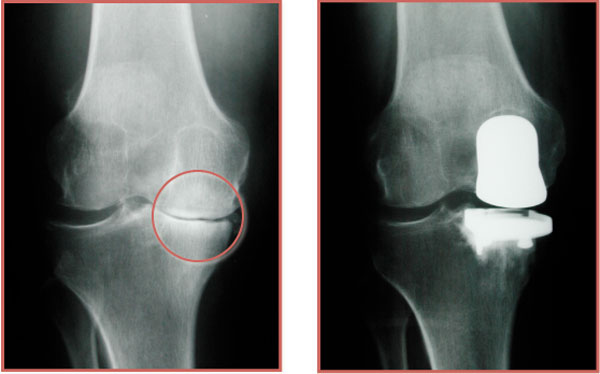Orthopaedic surgeons think about the knee as having (3) parts; the inside or medial compartment, the outside or lateral compartment and the knee cap or patellofemoral compartment. Partial knee replacements involve replacing one of these three compartments.

Partial vs Total Knee Replacement
The benefits of a partial knee replacement include less pain, a faster recovery and a lower risk of complications after the surgery when compared to a total knee replacement. Patients who have a partial knee may also have a knee that feels more “normal” as more of their own knee is kept in place including the anterior and posterior cruciate ligaments that stabilize the knee joint.
The potential negatives of a partial knee replacement include leaving behind parts of your knee joint that could be causing you pain.
In my practice about 1 in every 3 patients is a candidate for a partial knee replacement. In general, the best candidates for a partial knee replacement have arthritis in only one part of their knee, an intact anterior and posterior cruciate ligament and good range of motion or knee flexibility.

Patient who is appropriate for a partial knee replacement. Arthritis is only present on the inside of the knee (circle)
Data from Rush suggests that 90% of our partial knees are still working well at 20 years after surgery! Hence we view partial knee replacement as an alternative to a full knee replacement and not as a “bridge” procedure.
Journal Article: Long-term survivorship and failure modes of unicompartmental knee arthroplasty »
That is a common question and the answer is yes, you could develop arthritis in the other parts of your knee but it seems to be a rare occurrence. As described above, durability of our partial knees is 90% still working well at 20 years after surgery.
Most patients are comfortable returning to work 6-8 weeks after surgery. We can provide a maximum recovery time of 12 weeks.
We recommend that you use a walker, crutches or a cane for the first week after surgery. If you feel that you can walk safely without something after a week you may do so.
We would recommend that you work on exercises that focus on knee flexion/extension and also hip strengthening. Midwest Orthopaedics at Rush now has six physical therapy locations (https://www.rushortho.com/clinical-staff/physical-therapists) and we highly recommend these facilities as we know the physical therapists there and they will call us directly if you are having any type of an issue or problem that we need to be aware of. You may chose to do exercises on your own with the guidance of our texting service.
https://www.arthroplastyjournal.org/article/S0883-5403(18)30197-9/fulltext
The below video illustrates a partial knee replacement surgery completed by Craig J. Della Valle, MD.
http://youtu.be/ChvsxcfQ1NM